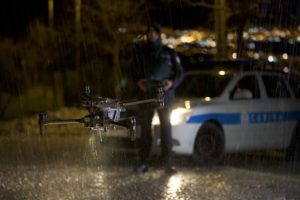New Legislation Balances National Security Concerns with Support for U.S. Drone Industry: “Drones for First Responders Act”
 New Legislation by Congresswoman Elise Stefanik Aims to Secure Drone Use for First Responders
New Legislation by Congresswoman Elise Stefanik Aims to Secure Drone Use for First Responders
A new legislative proposal in the U.S. Congress, known as the Drones for First Responders (DFR) Act, is poised to strike a careful balance between enhancing national security and supporting domestic drone manufacturing. This bill, which is expected to be introduced by Congresswoman Elise Stefanik (R-NY), emerges in response to concerns over the prevalent use of drones manufactured in the People’s Republic of China (PRC) by America’s first responders, which currently account for 90% of their equipment.
The DFR Act proposes several measures to reduce dependency on Chinese drones, which have been cited as a national security risk due to potential data vulnerabilities. The Department of Defense and several U.S. intelligence bulletins have highlighted the risks posed by PRC drones, prompting this legislative response.
The Act supports first responder programs by providing some time for programs to make the transition from Chinese drone technology, and providing funding to purchase new hardware. The Act stands in contrast to some proposals which require first responders to immediately replace their fleet, and do not provide funding to do so.
Key Proposals of the DFR Act:
- Tariffs and Incentives: The act introduces incremental tariffs on PRC-made drones, starting at 30% and increasing annually by 5%. This move aims to curb the import of Chinese drones and stimulate the U.S. and allied drone industries.
- Grant Program: A revenue-neutral grant program funded by these new tariffs will support first responders, critical infrastructure providers, and agricultural sectors in acquiring secure drones manufactured in the U.S. or allied countries. This initiative is designed to replace vulnerable equipment with secure and reliable alternatives without imposing financial burdens on essential services.
- Strengthened Import Regulations: By 2030, the legislation requires that drones imported into the U.S. must not contain any critical components manufactured in the PRC. This rule aims to ensure that all aspects of drone technology used in the U.S. are secure from foreign interference.
- Support for Domestic Industry: The grant program also includes provisions to bolster the domestic production of drones, providing a much-needed lift to U.S. manufacturers who have struggled against subsidized competition from Chinese firms.
The DFR Act reflects a nuanced approach to a complex problem—balancing the immediate need to secure critical technology used by first responders with the broader goal of nurturing the domestic drone industry. By funding the transition through tariffs on Chinese drones, the bill seeks to mitigate the impact on first responder programs that might otherwise face operational disruptions due to sudden equipment changes.
Chief Charles Werner (Ret.), Director of Public Safety UAS Alliance DRONERESPONDERS, expressed his support for the proposal.
“DRONERESPONDERS has been working with key partners to amplify the concerns of our public safety agencies nationwide. These agencies and their DFR programs are saving American lives on a routine basis. These agencies are anxious about potential bans on their drones before truly viable American alternatives become available, because the truth is, we aren’t there yet,” Werner said. “This new bill is far more reasonable, as it allows enough time for American drone companies to catch up, while creating grant funding for public safety to purchase American-made drones in the meantime. I’m happy to see that Congresswoman Stefanik and other members of congress are listening to public safety agencies and their concerns.”
This legislative effort highlights a strategic pivot towards enhancing U.S. competitiveness in drone technology while addressing the pressing concerns of national security and economic resilience in the face of international trade challenges.
Read more:
Miriam McNabb is the Editor-in-Chief of DRONELIFE and CEO of JobForDrones, a professional drone services marketplace, and a fascinated observer of the emerging drone industry and the regulatory environment for drones. Miriam has penned over 3,000 articles focused on the commercial drone space and is an international speaker and recognized figure in the industry. Miriam has a degree from the University of Chicago and over 20 years of experience in high tech sales and marketing for new technologies.
For drone industry consulting or writing, Email Miriam.
TWITTER:@spaldingbarker
Subscribe to DroneLife here.


